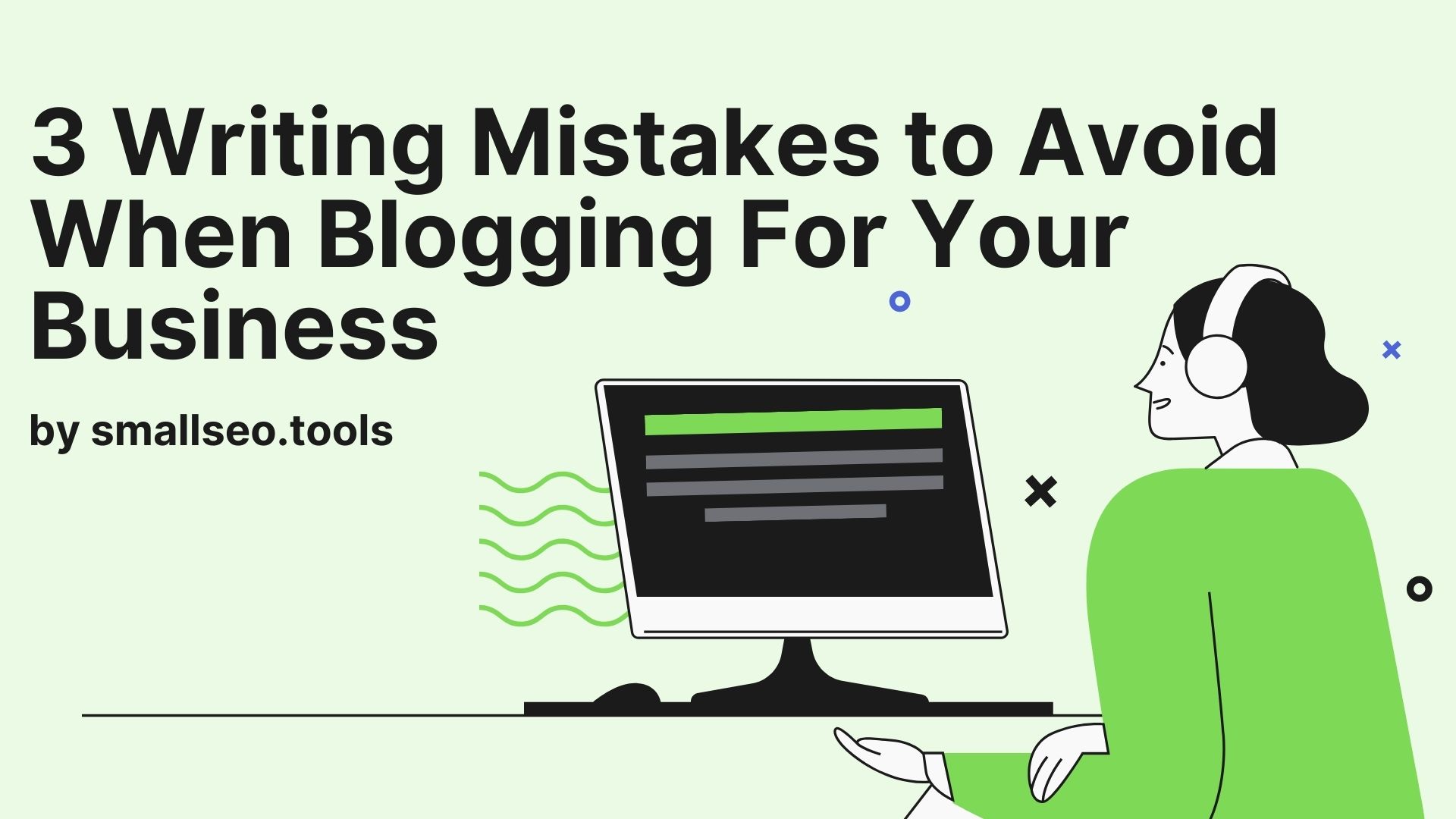3 Writing Mistakes to Avoid When Blogging For Your Business
In 2021, it’s not enough for your business to have its own website. Your website needs to be optimized to drive organic traffic.
By making your brand easier to find online, you’ll be in a better position to reach your customers.
And one of the best ways to reach those customers is through blogging.
According to SEMRush, 84% of companies have a content marketing strategy. While there’s a lot of content that businesses can create for marketing purposes, blog posts continue to be the most effective – outpacing email marketing, white papers, and ebooks.

In other words, blogging for your small business is the best way to consistently connect with your customers.
But knowing how to blog effectively for your business may not be as straightforward.
Whether you’re caught up in the day-to-day details of your operations or you don’t consider yourself to be a strong writer, it can be tough to get a handle on your content creation.
Failing to post new blogs regularly – or making any one of these five mistakes when writing a blog for your business – can derail your marketing efforts.
Here’s what you should watch out for as you update your business blog.
Boring Headlines
Creating awesome content is hard enough.
But all of your work might not matter if no one actually reads your posts.
Ultimately, you should be writing for human readers – not search engines.
So you need to convince web visitors to click.
Vague, overdone titles aren’t going to help you reach that goal.
So knowing how to write a compelling headline is crucial when starting a blog for your business.
Although your titles shouldn’t scream “click bait,” they should be captivating enough to convince web users to learn more.
You should never mislead your readers, but you can feel free to play on their curiosity.
To write more clickable headlines, we’d suggest:
- Adding odd numbers (they seem more trustworthy!)
- Including negative words (like “worst,” “don’t,” or “never”)
- Keeping it concise (60 words or fewer)
- Getting specific (too broad = less valuable and less relatable)
- Trying out alliteration (repeating sounds make for catchy headlines)
- Using a pun (clever or humorous titles can help you stand out)
Don’t be afraid to play around with your blog titles. You can even write them last to make sure they really capture what you’re trying to convey. If they don’t contain a sense of urgency or prompt curiosity, tinker with them until you’re satisfied.
Improper Grammar and Spelling
Grammar, punctuation, and spelling might not be among your strong suits.
While that isn’t technically a crime, it could actually hurt your brand.
According to a Grammarly poll, more than 93% of social media followers think that correct spelling plays an important or very important role during their shopping experience. What’s more, 91% of participants said poor grammar impacts the perceived credibility of news sources.
While your business may not be a media outlet, your brand does need to be seen as an authority within your industry. That’s the best way to build customer trust and credibility with your audience.
In addition, business blogs that contain poor grammar and misspelled words could have a higher time improving their site rankings.
Since spelling and grammar do have an effect on the visitor experience, it’s possible that your writing mistakes could drive customers away in droves. Google, in turn, may take notice and associate your site with a bad user experience.
As such, Google won’t recommend your page in relevant search results. Even if your content contains some useful information, your rankings may not improve due to the way in which you’ve delivered that information.
In other words, you need to ensure that your blog content is grammatically correct, contains no misspellings, and is generally easy to read.
If you make your visitors work overtime to understand what you’re trying to say, they’ll quickly become frustrated. And if they think you don’t care about spell-checking your blogs prior to publishing, they’ll probably assume you don’t put much effort into your products or services, either.
Whether you use a formal service or enlist the support of your own in-house grammar squad, ensure that your writing follows the basic rules of the English language.
Overly Formal Style
Above, we mentioned that you shouldn’t make your readers work too hard to understand your posts.
Even if your target customer is likely to have completed a higher level of education, that doesn’t mean they want to read a technical manual or decipher overly flowery language.
Your blogs should be easy to understand without talking down to the reader. Most experts recommend that you write for an eighth-grade reading level.
That gives you permission to get creative and use some industry terminology without confusing your audience.
Overall, you should aim for a conversational style that’s approachable and appropriate for your brand voice.
Even if your brand identity is based around upper-class luxury, you should still make sure your content resonates with your audience and that it feels aspirational (rather than exclusionary).
If you know you tend to be long-winded or a bit elitist in your language, ask a trusted colleague to help you with editing your blogs.
Be sure to eliminate any long paragraphs, as well. No one wants to read through blocks of text. Shortening your sentences and limiting your paragraphs to two or three sentences will automatically make your post seem more casual.
It’s fine to be a bit more formal if your brand calls for it. But in that case, it needs to be a conscious choice.
And if your brand is down-to-earth and approachable, make sure your blog posts reflect that. Use contractions, start sentences with “so” or “but,” and don’t feel beholden to everything you learned in English class.
Better Blogging = Better Branding
Blogging for your business can have a number of benefits. If you optimize your posts correctly and create valuable content that resonates with your readers, you can drive traffic and conversions.
When learning top blogging writing tips for businesses, you’ll also want to figure out which mistakes to avoid with your posts. With these examples in mind, you’ll be able to become a better writer and build a better relationship with your customers.
leave a comment
Please post your comments here.SEARCH
-
Popular SEO Tools
- Paraphrasing Tool
- Plagiarism Checker
- Article Spinner / Rewriter
- Keyword Position Checker
- Grammar Check
- Domain Authority Checker
- Pagespeed Insights Checker
- Reverse Image Search
- Page Authority checker
- Backlink Checker
- Alexa Rank Checker
- Backlink Maker
- Domain Age Checker
- Website Ping Tool
- Website Seo Score Checker
- Keyword Density Checker
- Website Page Size Checker
- Word Count Checker
- Mozrank Checker

 ™
™